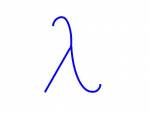MiniLisp
 Many years working with Lush have taken their toll.
There are many things I really dislike doing in C or C++
when I know how easy they would be in Lisp.
The essential lisp data structure is called the S-Expression.
S-Expressions can represent lots of complicated things
using a simple printable format. These are the main
reason why many people find XML or JSON appealing.
But I keep returning to S-Expression because they are so much simpler.
Many years working with Lush have taken their toll.
There are many things I really dislike doing in C or C++
when I know how easy they would be in Lisp.
The essential lisp data structure is called the S-Expression.
S-Expressions can represent lots of complicated things
using a simple printable format. These are the main
reason why many people find XML or JSON appealing.
But I keep returning to S-Expression because they are so much simpler.
MiniExp
At some point I decided to simply write a C++ library
to handle the basic lisp data structure: S-expressions.
The implementation fits in a single C++ file,
including a garbage collector and a pretty printer.
The full documentation is available as comments in
the header file miniexp.h
MiniExp handles four basic types of S-expressions:
- Integers, in range [-229…229-1].
- Symbols, which are small strings represented by a unique handle.
- Pairs, which are the basic components of lists.
- Objects, which encapsulate any C++ object derived from class
miniobj_t
Examples:
minivar_t a_symbol = miniexp_symbol("foo");
minivar_t a_number = miniexp_number(23);
minivar_t a_list = miniexp_cons(a_symbol, miniexp_cons(a_number, miniexp_nil));
minivar_t an_object = miniexp_string("Strings are implemented as objects.");
The type of the S-expression is miniexp_t.
But we often store them into variables of type minivar_t.
The difference is garbage collection.
The garbage collector preserves all S-expressions stored in a minivar_t
and all S-expressions recursively pointed by preserved S-expresssions.
To print a S-expression, one could write something like:
if (miniexp_numberp(exp))
printf("%d", miniexp_to_int(exp));
else if (miniexp_symbolp(exp))
printf("%s", miniexp_to_name(exp));
else if (miniexp_consp(exp))
....
But there is an easier way:
miniexp_print(exp);
and a prettier way:
miniexp_pprint(exp, 72); // 72 is the target number of columns
You can also read S-expressions from the standard input
minivar_t exp = miniexp_read();
See the documentation in file miniexp.h for more details.
MiniLisp
During the development of miniexp.h and miniexp.cpp, it
appeared that the best way to test s-expressions was to make
the last step and program a complete lisp interpreter.
Let's see what it can do:
MiniLisp, (C) 2005, Leon Bottou.
Available under the GNU General Public Licence.
(+ 2 3)
= 5
(defun (square x) (* x x))
= square
(square (+ 2 3))
= 25
(defun (sum l) (if (consp l) (+ (car l) (sum (cdr l))) 0))
= sum
(sum '(1 8 7 3))
= 19
(pretty sum)
(defun (sum l) (if (consp l) (+ (car l) (sum (cdr l))) 0))
= ()
(pretty pretty)
(defmacro (pretty f)
(let ((s (if (symbolp f) (list (list quote f)))))
(list (quote let)
(list (list (quote s) (list (quote funcdef) f . s)))
(list (quote pprint) (quote s) 72)
() ) ) )
= ()
The interpreter is very slow because symbol lookup is not optimized. But it makes a nice example of using MiniExp.
Download
The most recent MiniExp source code is available from the DjVu Git repository.
The documentation is in file miniexp.h.
You can also check the MiniLisp source:
